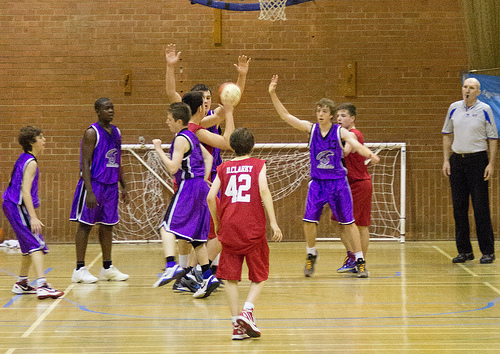- You are here:
- Home »
- Blog »
- Basketball »
- 5 Best Basketball Activities for Kids
5 Best Basketball Activities for Kids

Photo By: Nick Hubbard
Youth basketball players may be as passionate about the sport as older athletes, but the goal should still be for them to have fun, learn more about the sport, and learn skills and abilities that will help them develop for the future. These 4 basketball activities below are great for kids:
- Scrimmage – Just playing the game of basketball, either in a practice situation or in an actual game, is a great way for young athletes to get involved in the sport. This is the most important of all the basketball activities, because it is where kids learn to love the game of basketball. If they find out they don’t love the game, that is OK! Not everyone will love every sport. They may decide to just play on occasion for fun or not at all. Most young athletes get into a sport because they either really enjoy playing the game or enjoy watching others play. That passion for the game is what makes all of the drilling and conditioning work worth it for young athletes.
- Games – This is different from actually playing a normal game of basketball. This includes all the classic basketball games, like dribble tag, knockout, and so many more. Sometimes, running up and down a basketball court just loses its luster. In these times, it is a good idea to try working on the more fun parts of the game. They can take these less seriously, while still getting some competitive action and basketball skill work in. It also helps to provide a mental break from the more serious aspects of basketball and reminds them how fun it can be.
- Drills – Young athletes need to learn and develop the skill necessary to become better basketball players in junior high, high school, and beyond. Just playing games can lead to the development of poor habits and skills. To become well-rounded players, athletes need to drill on all the different skills needed for basketball players. This isn’t always fun for the athlete, but it is very crucial to their development if they have big aspirations on the basketball court. Drills allow for the athlete to improve all basketball skills, including ballhandling, passing, defense, shooting, and post moves. This is especially important for youth athletes, because it is too early to tell what may be their best position in the long run.
- Conditioning – Youth sports conditioning is an important part of long-term athletic development. This doesn’t have to be anything fancy. Basic running, push-ups, sit-ups, and the like will do the trick. These can be incorporated in small doses of daily practice. Conditioning can also improve an athlete’s confidence. This is also important for having the athlete learn about the role health and physical fitness play in a lifetime.
- Watching – Wait, you mean they don’t have to have a ball in their hands 24 hours a day? Some athletes can learn a lot from watching quality basketball, be it a local high school, or college or NBA on TV. They don’t necessarily have to be playing the game to get better at it. If you get the chance, taking them to a local high school or college game can allow them to have a great time and learn some important lessons. They can see what the expectations are at the next level and realize what they need to do to accomplish those goals.
Additionally, sometimes a break from the game is what is needed the most. Young athletes don’t need to focus on just 1 sport or activity year-round. Youth specialization can have negative effects on the athlete. We are talking risks of injuries, burnout, and lessened potential to improve in the sport over the coming years. Sometimes, getting an opportunity to play another sport or get complete rest is what is best in the short and long-term. Young athletes are not machines. They need both mental and physical breaks.
The most important basketball activities can be anything that is fun and gets the athlete more interested in becoming a better basketball player for the long-term. It is most important that the athlete develops a passion for the game, rather than taking a short-sighted approach that will leave them burned out from the sport before they finish high school.

